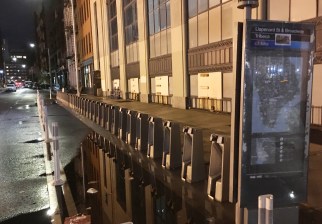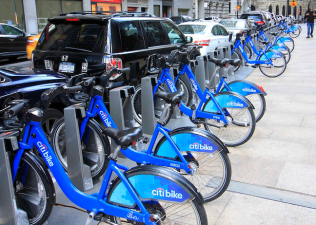De Blasio Seeks No Sanctions for Citi Bike Contract Violation

Mayor to Citi Bike: Take your time.
The de Blasio administration is apparently not moving towards collecting nearly $1.4 million in fines it could levy against Citi Bike for the calamitous mini-collapse this month of the bike share system, which is required by contract to have 97 percent of its 12,000-bike fleet available at all times.
The bikes have disappeared from the Citi Bike system due to repair work that the company announced this week after Streetsblog revealed the massive shortfall. On Friday, only 57 percent of the fleet was road-ready, the lowest this month, down from 59 percent from earlier in the week and down from 72 percent at the start of the month.
“Safety always comes first when it comes to any aspect of our transportation system,” mayoral spokesman Seth Stein told Streetsblog when asked if the city would invoke penalties under the contract. “We expect and require Motivate to rectify this situation and maintain a sufficient number of bikes on our streets to meet demand.”

Fine print in the contract requires Citi Bike to meet a dizzying array of “service level” benchmarks for its bikes and its docks, such as making timely repairs, properly cleaning the equipment and responding promptly to concerns. The contract stipulates a penalty of $15 per bike per day per day whenever the fleet level declines below 97 percent.
Doing the math, the contract requires 11,640 bikes to be available. Using the company’s own data, Citi Bike’s parent company Motivate failed to reach that level of service every single day in September, falling short by as little as 2,344 bikes on Sept. 1 to as many as 4,860 bikes on Sept. 28.
As a result, Motivate owes the city $1,369,050 in fines for insufficient bike availability. (To understand how this figure was compiled, see Appendix A pages 80 and 88 of the Citi Bike contract below.)
But DOT spokesman Scott Gastel confirmed late Friday, “We have not sought any damages from Motivate yet.”
Gastel did not answer Streetsblog’s other question, however: Whether city officials were aware of Motivate’s repair problems before Streetsblog broke the story on Wednesday, forcing the company to go public. The contract says that DOT Commissioner Polly Trottenberg can ignore fleet level standards if she wishes, so Trottenberg may have done so when Motivate first discovered the handlebar flaw behind the repair crisis.
“Changes to required Bicycle Fleet Levels are subject to the reasonable approval of DOT on a basis consistent with Appendix A.”
DOT did not respond to a question about whether Trottenberg approved the reduction in service level in advance of the crisis.
Motivate has also declined to comment further, sticking with its original statement to its 145,000 members. A source did say that more than 75,000 rides were taken on Citi Bikes on Thursday, close to the system’s 80,000 record.
The repair crisis comes at a sensitive time for the nation’s biggest bike share system, which is owned by Lyft. The city and Motivate have struggled to expand the program beyond its inner Brooklyn and Manhattan core, even as the bike share industry is growing thanks to dockless systems such as Lime and the Uber-owned Jump.
Pilot programs in the Bronx, Staten Island and the Rockaways have shown mixed results, however, buying Citi Bike more time.
This story was updated on Friday, Sept. 28 at 8 p.m. to reflect new information from DOT.
New York City Citi Bike Contract 2014 by Gersh Kuntzman on Scribd




